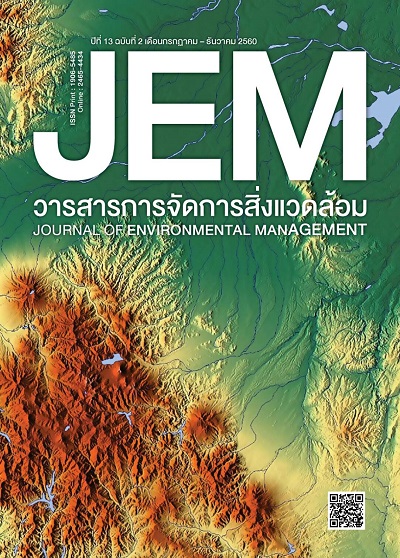การเปลี่ยนแปลงสภาพภูมิอากาศกับการเปลี่ยนแปลงภูมิปัญญาในการทำประมงของชาวประมงพื้นบ้าน: กรณีศึกษาชุมชนชายฝั่งสี่หมู่บ้านในอ่าวเกาะมุกด์ จังหวัดตรัง CLIMATE CHANGE AND CHANGES IN FISHING THE WISDOM OF THE SMALL-SCALE FISHERY
บทคัดย่อ
การวิจัยเชิงคุณภาพนี้มีวัตถุประสงค์เพื่อศึกษาสถานภาพของภูมิปัญญาท้องถิ่นเกี่ยวกับการทำประมงพื้นบ้านในปัจจุบันของชาวประมงพื้นบ้านในชุมชนชายฝั่งสี่หมู่บ้านในอ่าวเกาะมุกด์ จังหวัดตรัง ใช้วิธีการเก็บข้อมูลด้วยวิธีการสัมภาษณ์ชาวประมงพื้นบ้าน จำนวน 28 คน และสนทนากลุ่ม จำนวน 4 ครั้ง กับชาวประมงพื้นบ้านผู้มีประสบการณ์การทำประมงมายาวนาน จำนวน 27 คน ผลการวิจัยพบว่า ภูมิปัญญาเกี่ยวกับการทำประมงพื้นบ้านมี 2 ประเภท ได้แก่ 1) ภูมิปัญญาในการจับสัตว์น้ำ ประกอบด้วย การสังเกตแหล่งที่อยู่อาศัยและลักษณะตามธรรมชาติของสัตว์น้ำ และ 2) ภูมิปัญญาในการสังเกตการเปลี่ยนแปลงของลมฟ้าอากาศ แต่ในช่วง 15 ปีที่ผ่านมานี้ชาวประมงพื้นบ้านไม่สามารถนำภูมิปัญญาท้องถิ่นในการจับสัตว์น้ำมาใช้ได้ เนื่องมาจากการทำประมงด้วยเครื่องมือประมงพาณิชย์ส่งผลให้ฝูงปลามีขนาดเล็กลง และแหล่งประมงมีความเสื่อมโทรมส่วนภูมิปัญญาในการสังเกตลมฟ้าอากาศ ปัจจุบันไม่สามารถนำมาใช้ประโยชน์ได้มากนัก เนื่องจากสภาพภูมิอากาศแปรปรวนและเปลี่ยนแปลงอย่างรวดเร็วชาวประมงพื้นบ้านต้องปรับตัวด้วยวิธีการต่าง ๆ ได้แก่การนำเทคโนโลยีเข้ามาช่วยในการทำประมง เช่น การใช้เครื่องซาวน์เดอร์และเครื่องจีพีเอส รวมทั้งมีการติดตามตรวจสอบข้อมูลการพยากรณ์อากาศอย่างต่อเนื่อง และพยายามใช้เวลาในการทำประมงให้รวดเร็วที่สุดด้วยการรีบเข้าและออกจากฝั่ง
This qualitative research aims to study the local wisdom of small-scale fishermen in the current fishing situation. The research area covers four coastal communities in Mook island Bay, in Trang Province. The research methodology includes interviews with twenty eight small scale fishermen and four focus group discussions with twenty-seven experienced fishermen. It was found that the local fishing wisdom of small-scale fishers can be classified into the following two types: 1) fishing wisdom regarding the observation of the characteristics and habitats of aquatic animals, and 2) wisdom in term of observing weather changes. However, the fishermen have not been able to use such wisdom for fifteen years, as destructive commercial fishing has decreased the number of fish groups. Fishery habitats have also been ruined. On the other hand, wisdom in term of observing weather changes is not applicable any longer due to the rapid changes and variability of the weather. Various patterns of the fishermen’s adaptation included employing fishing technology, particularly sounders and GPS devices, as well as consistently checking weather forecast information. They also tried to go fishing as quickly as possible by rushing away from and to the shore.
เอกสารอ้างอิง
Berkes, F. (1993). Traditional Ecological Knowledge in Perspective. In: J. T. Inglis (Ed.), Traditional Ecological Knowledge: Concepts and Cases (pp. 1 – 9). Ottawa: International Program on Traditional Ecological Knowledge and International Development Research Centre.
Bundhuwong, C., Koonpol, P., Tanaworapong, C., Nhurit, C., Kumkrai, N., Eawsakul, B., & Andaman Fisherfolk Club. (2000). Long Tail Boat (Huatong): Development, Characteristic and Adaptation of the Andaman Fisherfolk [In Thai]. Bangkok: Akson Thai Printing Ltd.
Chanthawanit, S. (2011). Data analysis in qualitative research [In Thai]. Bangkok: Chulalongkorn University Press.
Committee of 4 Villages for Aquatic Larvae Conservation Area. (n.d.). “Khate-lae-sae-bann” Four Villages Conservation Area (Aquatic Larvae Conservation Area), Trang Province [In Thai]. Collaborative Network of Save Andaman Network (SAN). Trang: PP Printing.
Department of Fisheries (Thailand). (1997). Definitions and classification of Thai marine fisheries tools. [In Thai]. Bangkok: Agricultural Cooperative Federation of Thailand.
Ferrol-Schulte, D., Wolff, M., Ferse, S., & Glaser, M. (2013). Sustainable Livelihoods Approach in tropical coastal and marine social–ecological systems: A review. Marine Policy, 42, 253 – 258.
[IPCC] Intergovernmental Panel on Climate Change (2007). Climate Change 2007: Synthesis Report. Contribution of Working Groups I, II and III to the Fourth Assessment Report of the Intergovernmental Panel on Climate Change. Geneva, Switz erland: IPCC.
[IUCN] International Union for Conservation of Nature. (2009). Fisherfolk Wisdom to Follow Changes in Marine Ecosystems and Coastal Areas. A Collaborative Project to Monitor Changes in Seagrass Ecosystem by the Community Engagement [In Thai]. Retrieved April 7, 2016, from http://cmsdata.iucn.org/downloads/local_knowledge_about_marine_and _ coastal_issues__thai_.pdf
Jussapalo, C., Jussapalo, S., Maeroh, A., Rattanachoo, W., & Chanabhundith, A. (2013). Development model of fishery resources Management for Self-reliance of Local Fishery on Sa-rai Islands, Satun Province [In Thai]. Final report. Thai land Research Fund.
Kansuntisukmongkol, K., Boontan, O., Phunbamphen, D., Rattanadechakorn, J., Chaimongkol, C., Sornhiran, N., & Kruakaew, P. (2012). Mechanisms Driving Community-based Adaptation to Climate Change: A Comparative Study of Fishery Communities in Palian watersheds network, Trang Province and Prasae watersheds network, Rayong Province [In Thai]. Final report. Thailand Research Fund.
Lookrak, M. (2000). Local wisdom in Seashore fishery conversation: A case study of Lam Makam village, Kao Mikaew Subdistrict, Sikao District, Trang Province. Master’s thesis, Chiang Mai University.
Meksumpun, C., Boonwanich, T., & Boonpakdee, S. (2012). Synthesis of Research Plans on Conservation and Development of Indo-Pacific Chub Mackerel Resource of the Gulf of Thailand. [In Thai]. Final report. Thailand Research Fund.
Nasae, B. (2002). Community based coastal resource management: A case study from Southern small scale fisheries communities [In Thai]. Southern Coastal Resources Management Project. Bangkok: Fuengfa Printing.
Phasuk, B. (1989). The results of joint government and private sector seminars: The future of Thai fishery [In Thai]. Bangkok: Southeast Asian Fisheries Development Center.
Phiriyathanalai, S., & Bonlee, S. (2015). A Research Final Report of Learning Project to Reproduce Indigenous Knowledge of Fishery in Fisherfolk Community in Pattani Bay (The Second Phase) [In Thai]. Final report. Thailand Research F und.
Rubchan, T. (2007). Situation of Traditional Fisheries and Problems of the Traditional Fishermen in Songkhla Lake Basin, Songkhla Province. Master’s thesis, Prince of Songkla University.
Royal Ordinance on Fisheries B.E. 2558. [In Thai] (2015). In Royal Government Gazette, 132, Part 108 kor, dated November 13, 2015 (pp. 1 – 45). Retrieved April 17, 2017, from http://www4.fisheries.go.th/file_footer/20160517105511_file.pdf
Sales, R. F. M. (2009). Vulnerability and Adaptation of Coastal Communities to Climate Variability and Sea-Level Rise: Their Implications for Integrated Coastal Management in Cavite City, Philippines. Ocean & Coastal Management, 52, 395 – 404.
Salik, K. M., Jahangir, S., Zafar, W. U. Z., & Hasson, S. U. (2015). Climate Change Vulnerability and Adaptation Options for the Coastal Communities of Pakistan. Ocean & Coastal Management, 112, 61 – 73.
Sanlee, D. (2011). Population Biology of Blue Swimming Crabs Portunus pelagicus (Linnaeus, 1758) in the Conserved Area for Early Life Stages of Aquatic Fauna along Four Villages in Trang Province [In Thai]. Master’s thesis, Prince o f Songkla University.
Sugunnasil, W. (2000). Problems & Alternatives in Community-Based on Marine Resource Management in Southern of Thailand [In Thai]. Final report. Thailand Research Fund.



